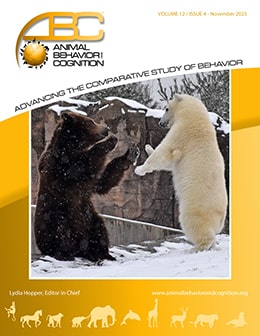Vol 12, Issue 4, November 2025
Paternal-Tadpole Interactions During Tadpole Deposition in the Three-striped Poison Frog, Ameerega trivittata
Citation
d’Orgeix, C. A., Klimkowski, V. B., Monroe, A. A., Weiford, T. E., Whalen, M. A., & Jairam, R. (2025). Paternal-tadpole interactions during tadpole deposition in the three-striped poison, Ameerega trivittata. Animal Behavior and Cognition, 12(4), 473-487. https://doi.org/10.26451/abc.12.04.01.2025
Abstract
Anurans (frogs and toads) have the widest diversity of parental care strategies among tetrapods, yet relatively little is known about parental-offspring behavioral interactions for most species. In most species in the clade Dendrobatoidea, a parent transports tadpoles on their dorsum from a terrestrial hatching site to a water source for continued development. Tadpoles typically swim off their parent’s back upon reaching a water source. However, we hypothesized that males may actively attempt to remove tadpoles following initial observations of male three-striped poison frogs, Ameerega trivittata, attempting to forcibly remove tadpoles by “wiping” them from their dorsa upon reaching a water source. We describe and quantify male wiping behavior and its success in removing tadpoles. Additionally, we describe and quantify tadpole behavior upon being removed from a male’s dorsum. Twenty males were videotaped transporting and removing tadpoles at Brownsberg Nature Park, Suriname. Male wiping behavior was unsuccessful 92% of the time (n = 415 attempts). In successful cases, tadpoles swam in circles next to the male. Males then responded by jumping to a new location in the pool or moving out of the pool. Male wiping behavior appears to be both energetically and temporally costly in contrast to other members of the Dendrobatoidea, where tadpoles swim off the male’s dorsum when reaching an aquatic deposition site. These findings add to our understanding of life history variation in this diverse clade of frogs and suggest a bet-hedging behavior that may further influence this species’ evolutionary response to climate change.
Keywords
Amphibians, Dendrobatoidea, Ameerega trivittata, Poison frog, Tadpole transport, Male transport behavior, Parental behavior, Bet-hedging
